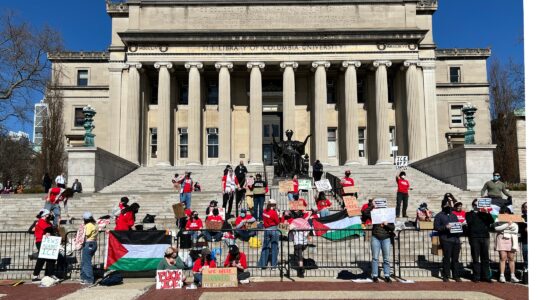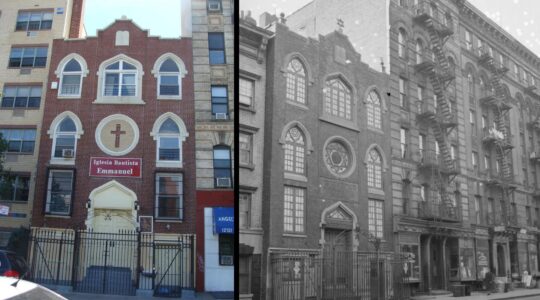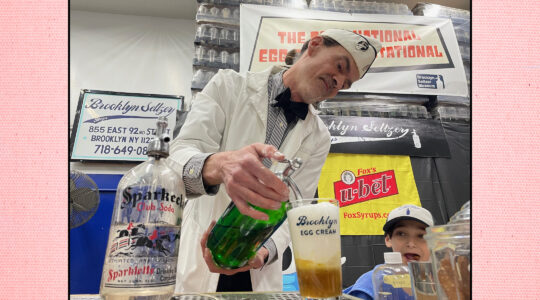When Mordechai Levovitz learned that a civil rights organization had announced a lawsuit against a Jewish counseling center in New Jersey that claims to “cure” homosexuality, he felt mainly rage. This was despite the fact that he is co-director of an organization, JQY, that tries to be a haven for Jews who say they are traumatized by the kind of treatment the counseling center offers.
The rabbis who promote this so-called reparative therapy are as guilty as the center itself for ruining the lives of religious gay people, and even driving some to suicide, he said. But they won’t be brought to justice in this lifetime, he added.
“It is not the Torah that makes people suicidal, for there are many commandments that Jews struggle with,” said Levovitz, who was raised and still identifies as Orthodox. “It is the shame created by the community. Rabbis … who reinforce this shame make life unbearable. The blood is on their hands.”
The lawsuit, filed by the Southern Poverty Law Center on Nov. 27, shines a spotlight on an Orthodox world caught in the grip of a painful conflict. After the suit was announced, the centrist Orthodox Rabbinical Council of America further distanced itself from JONAH, the counseling center. A traditional journal characterized homosexuality as an abomination. All the while, the individuals whose lives are the subject of such intense debate are trying to figure out how to be gay and Jewish in ways that feel true to them.
The 2001 film “Trembling Before G-d,” which followed gay and lesbian Orthodox Jews and interviewed rabbis and therapists, spurred the Orthodox world to begin grappling more openly with homosexuality, still viewed in the most traditional communities as a perversion. The years since have seen a series of statements and forums, including one at Yeshiva University in 2009 that focused on the importance of empathy. Levovitz co-founded JQY about a decade ago.
Nearly a third of the New York metropolitan’s area’s 1.5 million Jews are Orthodox, according to the population survey released in June by UJA-Federation of New York.
The lawsuit charges JONAH, formerly known as Jews Offering New Alternatives for Healing, with fraud for claiming to convert people from gay to straight. It calls for both JONAH’s closing and monetary compensation of an as-yet unspecified amount that would include triple the amounts the plaintiffs paid to JONAH, the cost of therapy undergone as a result of the experience with JONAH and other items for the four plaintiffs.
Three of the plaintiffs — Chaim Levin, 23; Benjamin Unger, 25; and Sheldon Bruck, 20 — are members of JQY. The fourth, Michael Ferguson, 30, comes from a Mormon background, said Sam Wolfe, a Southern Poverty Law Center lawyer involved with the case. Jo Bruck and Bella Levin, Sheldon and Chaim’s mothers, are also plaintiffs.
JONAH will be defended by the Freedom of Conscience Defense Fund, a nonprofit law firm that provides defense services to clients whose religious liberty and free speech rights have been compromised, according to a statement from the fund. The SPLC lawsuit seeks to violate the First Amendment freedoms of speech, religion and association, said Charles LiMandri, the fund’s president, in the statement. JONAH, the statement says, has helped clients resolve unwanted same-sex attractions.
The suit describes individual sessions, which cost a minimum of $100, and group sessions, which cost $60, in which Jonah’s clients were instructed to undress; sometimes the counselor was naked as well. Clients were also urged to blame their parents for making them gay and to beat effigies of their mothers.
The Southern Poverty Law Center first reached out to JQY members to ask for their help with a campaign to raise public awareness about and discredit reparative therapy. Later, the organization asked them to serve as plaintiffs on the related lawsuit, said Levin. His “It Gets Better” Internet video about being raised religious and coming out as gay brought him to the center’s attention.
Levin, who grew up in the Chabad community in Crown Heights, Brooklyn, sought help at JONAH after he was thrown out of his yeshiva at age 17 for being gay. He complied when his therapist, referred by JONAH, asked him to touch himself during the therapy, and then quit.
After spending two years trying to become straight, Levin needed three years — and more therapy — to undo the harm that effort inflicted on his psyche, he said. He came out about three years ago and is now one of the Orthodox LGBT world’s most visible spokesmen.
The day after the lawsuit was announced, the rabbis who produce Dialogue, an Orthodox journal, released an article condemning homosexuality as a biblical abomination through public websites, like weebly.com, and the e-mail listserv of the AJOP, or Association for Jewish Outreach Programs.
“Engaged in an act that is entirely Self-directed, the homosexual is, in effect, having relations with his own image,” wrote Rabbi Aharon Feldman, the head of Yeshivas Ner Yisroel in Baltimore, in his article. “He has taken an act that God intended to be one that is creative and engenders bonding, and has, instead, created a parodic mirror image of it that is maximally selfish and self-fulfilling.”
Rabbi Feldman could not be reached for comment on the timing of his piece’s publication, and his co-editor Rabbi Moses Meiselman, the head of Toras Moshe in Jerusalem, said in an e-mail that the “entire project was managed by Rabbi Feldman.”
“The edition of Dialogue was many months in planning and coincided with ongoing events in general and nothing in particular,” he wrote.
However, two days after the lawsuit was announced, the Rabbinical Council of America, a professional association of more than 1,000 Orthodox rabbis, issued a statement repudiating JONAH.
The RCA had already tried to retract a 2004 letter featured on JONAH’s website suggesting rabbis refer their congregants to it, said Rabbi Shmuel Goldin, the RCA’s president. People who had been hurt by their experiences with JONAH reached out to the RCA, which in turn consulted with experts and came to question whether JONAH met its standards for trained mental therapists who abide by the values and ethics of their profession.
“The Torah is very clear that this lifestyle is outside the purview of normative Judaism,” Rabbi Goldin said. “We urge individuals to connect with the Jewish community and connect with rabbis and deal with those issues the best they can. We are against any kind of personal prejudice or acts of violence, God forbid, against any person.”
Orthodox attitudes toward homosexuality are changing in subtle ways, said Miryam Kabakov, co-director of Eshel, the group founded in 2010 that tries to help gay people stay “frum [observant], happy and healthy.”
These shifts, she said, are mostly in attitude and in private interactions between individuals, because a public statement could result in communal censure or pressure.
Still, views like those of Rabbi Feldman’s are making “Aron,” a New York-area man in his 30s who was raised “black-hat” Orthodox, question the fundamentals of Orthodoxy.
He underwent the “typical shidduch process,” going on arranged dates with a view toward marriage and then divorcing after he told his wife that he was gay. Today, he is still Orthodox. He has not told any of the traditional communities he has ties to that he is gay.
Despite his growing frustration with the Orthodox world’s position on homosexuality, it still doesn’t make sense for him to try to create a new place for himself altogether, either.
“It doesn’t make sense because of millenia of halachic norms, and communal norms,” he said. “It doesn’t make sense because I haven’t let go of the idea that the Torah is divine in origin. I may be angry, but it’s hard to turn your back on [that world], especially as a pretty well-educated Jew.”
helenatjewishweek@gmail.com; @thesimplechild
The New York Jewish Week brings you the stories behind the headlines, keeping you connected to Jewish life in New York. Help sustain the reporting you trust by donating today.




